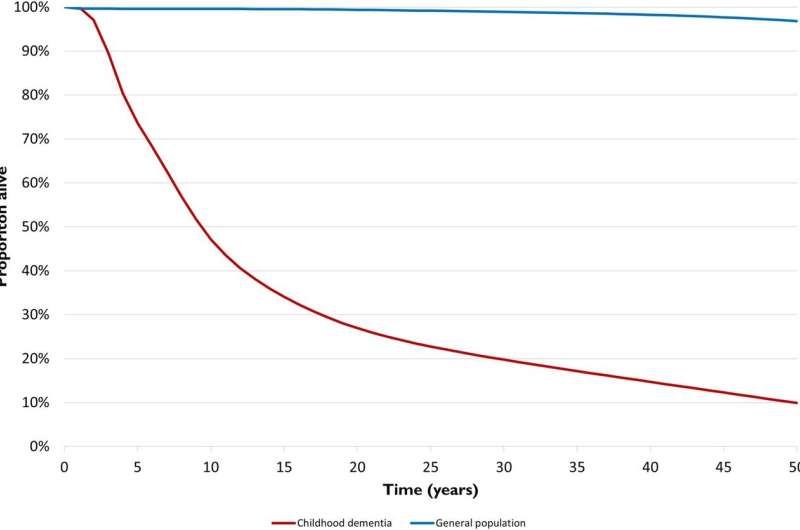This article has been reviewed according to Science X's editorial process and policies. Editors have highlighted the following attributes while ensuring the content's credibility:
fact-checked
peer-reviewed publication
trusted source
proofread
Devastating causes of childhood dementia revealed

It is a heartbreaking condition that robs children of their ability to walk, talk and recognize their loved ones and now the latest research has revealed the true impact of childhood dementia globally.
In the collaborative study, experts from the University of Adelaide, the Childhood Dementia Initiative, the University of New South Wales, Murdoch Children's Research Institute and leading Australian clinicians have for the first time defined the 145 genetic disorders that cause childhood dementia.
"This study provides a clearer picture of who is affected by these devastating and under-recognized conditions," said Dr. Nicholas Smith, Head of Pediatric Neurodegenerative Diseases Research Group at the University of Adelaide.
"The 145 disorders we have classified as childhood dementia are complex and varied. Tragically, what they share in common is the heartbreaking, progressive neurocognitive decline and a severely shortened life expectancy."
The findings have been published in the journal Brain.
Childhood dementia results from progressive brain damage caused by a collection of genetic disorders.
Just like adults with dementia, children with childhood dementia experience symptoms such as memory loss, confusion, personality changes, severely disturbed sleep and difficulty concentrating, understanding, learning, and communicating.
The study, which involved analysis of published data from Australia and overseas, and modeling by heath economists at Thema Consulting, shows dementia symptoms typically start when the patient is just 2.5 years old, with the average age of diagnosis around 4 years old.
The average life expectancy for patients is just nine years, with 70% of children dying before they turn 18.
"Childhood dementia is a cruel condition that robs children of the skills that they have only just learned—to speak, play and to recognize their loved ones. This can happen over months, years, or decades until eventually the brain loses the ability to keep the body alive," said Dr. Kristina Elvidge, Head of Research at the Childhood Dementia Initiative.
"Currently treatment options are severely limited, hard to access and research to develop effective treatments and cures is poorly funded. Improvements to care and support for affected families are also desperately needed and we hope this new research will lead to better outcomes for these children."
While individually the genetic disorders are rare, collectively, more than 100 babies born each year in Australia will develop childhood dementia. This is as common as well-known disorders like cystic fibrosis.
This study estimated that 91 Australians die from childhood dementia each year—a similar number to the those that die from childhood cancer (0–14 years).
"While there is significant resourcing for adult-onset dementia, similar services do not exist for childhood onset disease, despite their need," said Dr. Smith.
"The collective burden of childhood dementia is significant, and this new research will raise awareness of the scale of these conditions with researchers, clinicians, government and policymakers both nationally and internationally."
More information: Kristina L Elvidge et al, The collective burden of childhood dementia: a scoping review, Brain (2023). DOI: 10.1093/brain/awad242





















